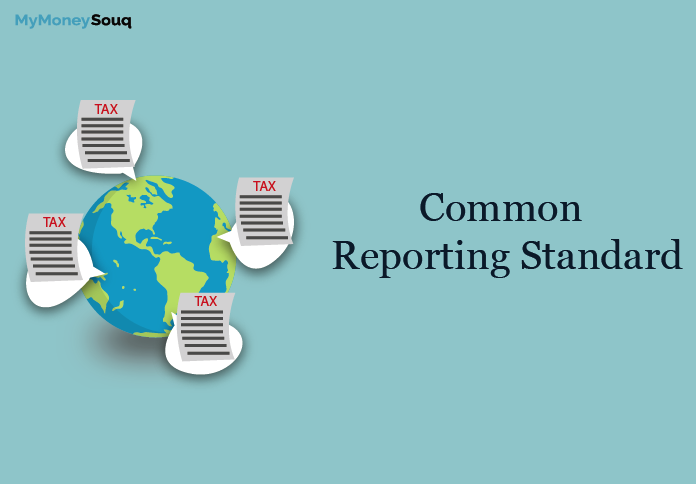Common Reporting Standard (CRS) is a global initiative that is issued by the Organization for Economic Cooperation and Development. Under this standard system, banks are required to collect information about the tax residency status. If an individual is tax resident outside the UAE where an individual account is held, this information will be given to the concerned UAE authorities along with the account information. This related information is shared with the tax authorities of the foreign countries where an individual is tax assessed, this information is pursuant to the information exchange agreement that the UAE government has with the concerned country.
In the UAE, CRS has been designated as to maximize the efficiency of and reduce the expenses of financial institutions and draws which approach extensively from FACTA implementation. There are three dimensions that the scope of the CRS covers.
- Scope of reporting financial information
- Scope of reporting subject of account holders
- Scope of what financial institutions should report
Financial institutions such as Abu Dhabi Islamic Bank PJSC or any affiliates should collect and report information related to Account holder’s tax residency, information related to account, and controlling persons to the concerned UAE authorities.
Each and every jurisdiction has its own rules for collecting the tax and the tax jurisdiction have given the information on how a residential status is determined in the jurisdiction on the Organization for Economic Co-operation and Development website.
What is the purpose of CRS?
The purpose of the CRS is to combat tax evasion and protect the national integrity of tax systems. Countries around the world have integrated and introduced this information gathering system which is commonly known as CRS. If there is any possibility of tax evasion, the entities can exchange information relevant to the other participating countries’ legal tax authorities. Then the authorities of the other countries will determine the tax burden and take appropriate actions.
This idea was based on the Foreign Account Tax Compliant Act (FATCA) implementation agreement. This is legally based on the convention system under Mutual Administrative Assistance in tax matters. There are a total of 97 countries that signed the agreement and the implementation process has been done according to the agreement. The first CRS Implementation was done in the year 2017 and many other countries started in the year 2018.
What information will be exchanged between the countries?
The information sharing between the countries is according to the format which is governed by the standards. Organization for Economic Cooperation and Development allows countries to find out what accounts are eligible for reporting. The term reportable account means Jurisdiction A account, or Jurisdiction B account which is identified according to the due diligence procedures according to the agreement between the countries.
Every participating country will yearly exchange automatic information with the other participating country with the information in the format of Jurisdiction A along with each Jurisdiction B reporting account. Similarly, Jurisdiction B will share the information of the accounts of individuals with Jurisdiction A.
The following are the details that will be exchanged with the countries.
- Name, address, Tax Identification Number, date of birth, place of residence, place of birth of each reportable person.
- Details about reportable person
- Account number
- Identification number and name of the person reporting financial institution
- Account balances or total value at the end of each year. If the account is closed the closure value.
- Capital gains, types of accounts, dividends, interests, gross redemptions and proceeds
- Reportable accounts
How Tax residency is determined?
The tax residency that is defined actually depends on where a resident lives and occupational circumstances. You need to contact a professional tax adviser and check with taking their expert advice on your tax residency. Or you can also check in the Organization for Economic Cooperation and Development official website for more information on how to determine your tax residency.
All the banks including the insurers and asset management companies that are in participating jurisdictions and the countries are legally required to comply with the Common Reporting Standards.
Click here for Taxation system in the United Arab Emirates
What should you do?
Every bank’s customer who has an account in the UAE has to comply with the banking rules and should complete the CRS Self Certification form.
To complete the CRS Self certification Form, contact your bank branch and submit your details. By completing this form it will enable you to hold accurate details and updated information about your tax residency. Within the 90 days, you should be able to provide a completed CRS Self Certification Form. Consult professional tax advisory services and take assistance from them, banks will not provide advisory services. The information that you provide to the bank will be shared with the appropriate UAE authorities.
The information provided will be safe and secured.
Duties and responsibilities of account holders
- You should provide the necessary information which is requested in the form of CRS Self Certification. Provide your tax status or evidence if required to the authorities.
- You have to provide a list of all the jurisdictions in which you are tax resident and also provide your Tax identification number of each jurisdiction to the authorities.
- In a reasonable time, if there is any change in the tax status, you should notify the bank.
In the UAE, bank customers are required to follow the instructions of the contractual relationship with the bank. If the customers do not adhere to the terms and conditions and if customers do not provide adequate information to the authorities, then the bank can refuse the contractual agreement. The bank has the right to terminate the agreement and send a report to the local tax authorities with the available information. In certain cases, the bank can also block the account of the account holder. The account can be opened only after legal clearance.

